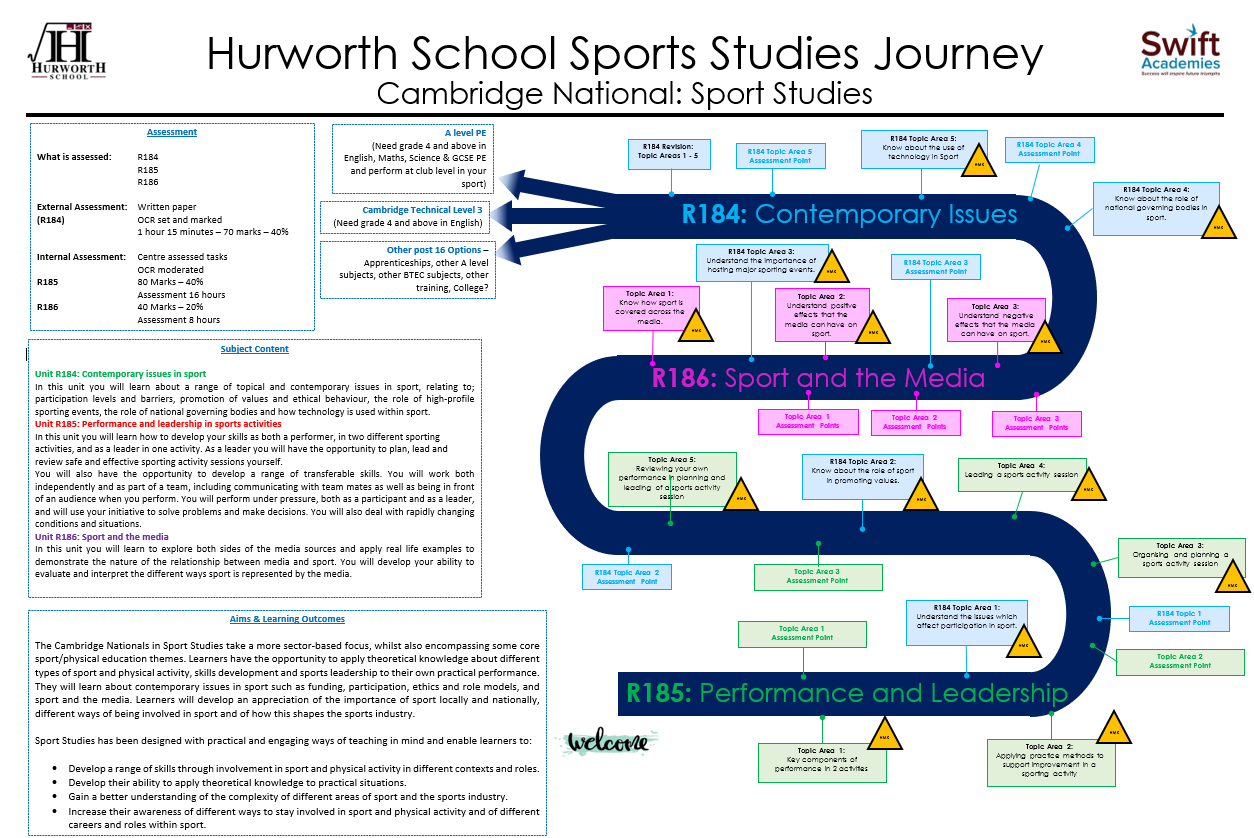Why do we study Physical Education?
We believe that a high quality PE curriculum should provide all students with an opportunity to have equal access to a broad, balanced and relevant curriculum. The intended outcome is that students will improve their maximum potential physically, socially, emotionally and cognitively, while developing a lifelong love of physical activity and sport. We supply students with the knowledge to make informed decisions regarding healthy lifestyles and provide as much physical activity as possible to improve fitness levels.
Key skills and concepts, relevant to examination courses, are interwoven into the curriculum within the practical context via Independent Learning Tasks. As students progress through Key Stage 3, they should broaden and embed the basic skills and knowledge learnt in Year 7, which will prepare them for examination PE at Key Stage 4. At examination level students will develop effective tactical and strategic decisions alongside mastering key skills. Those students who do not opt for examination PE will continue to develop the key skills and knowledge through recreational play.
At Hurworth School the PE department:
- Interests and motivates, both through its content and its range of Teaching and Learning styles
- Enables students to develop their knowledge, understanding and skills according to their interests and abilities
- Allows students to make progress at a challenging pace, which also provides for the development of special aptitudes
- Meets the broader needs of our children in an ever changing world
- Provides an environment in which ALL students can achieve success, where all students are valued and respected and extend the same value to others
- Portrays the concept of learning as a desirable, life-long and enjoyable process
- Monitors the fitness levels of students over time by a termly fitness test
Choose a path
- KS3 Year 7-11
- AQA GCSE PE
- OCR Cambridge National Sports Studies
- VCERT Technical Award Level 1/2 Health & Fitness
PE – Read & Watch List
KS3 Year 7-11
Year 7
Learning Outcomes
The work that we do in curriculum time and in extra-curricular activities during Year 7 is designed to provide all students with an opportunity to have equal access to a broad, balanced and relevant curriculum. Throughout the year students will develop their basic skills, knowledge and understanding of the rules and scoring systems of team and individual activities. Key theoretical concepts, relevant to examination courses, are interwoven into the curriculum within the practical context via Independent Learning Tasks.
Topics Taught
Autumn Term
- Trampoline
- Table Tennis
- Netball
- Rugby
- Baseline Testing
Spring Term
- Hockey
- Gymnastics
- HRF
- Basketball
- Dance
- Handball
Summer Term
- Cricket
- Rounders
- Softball
- Volleyball
- Tag Rugby
- Athletics
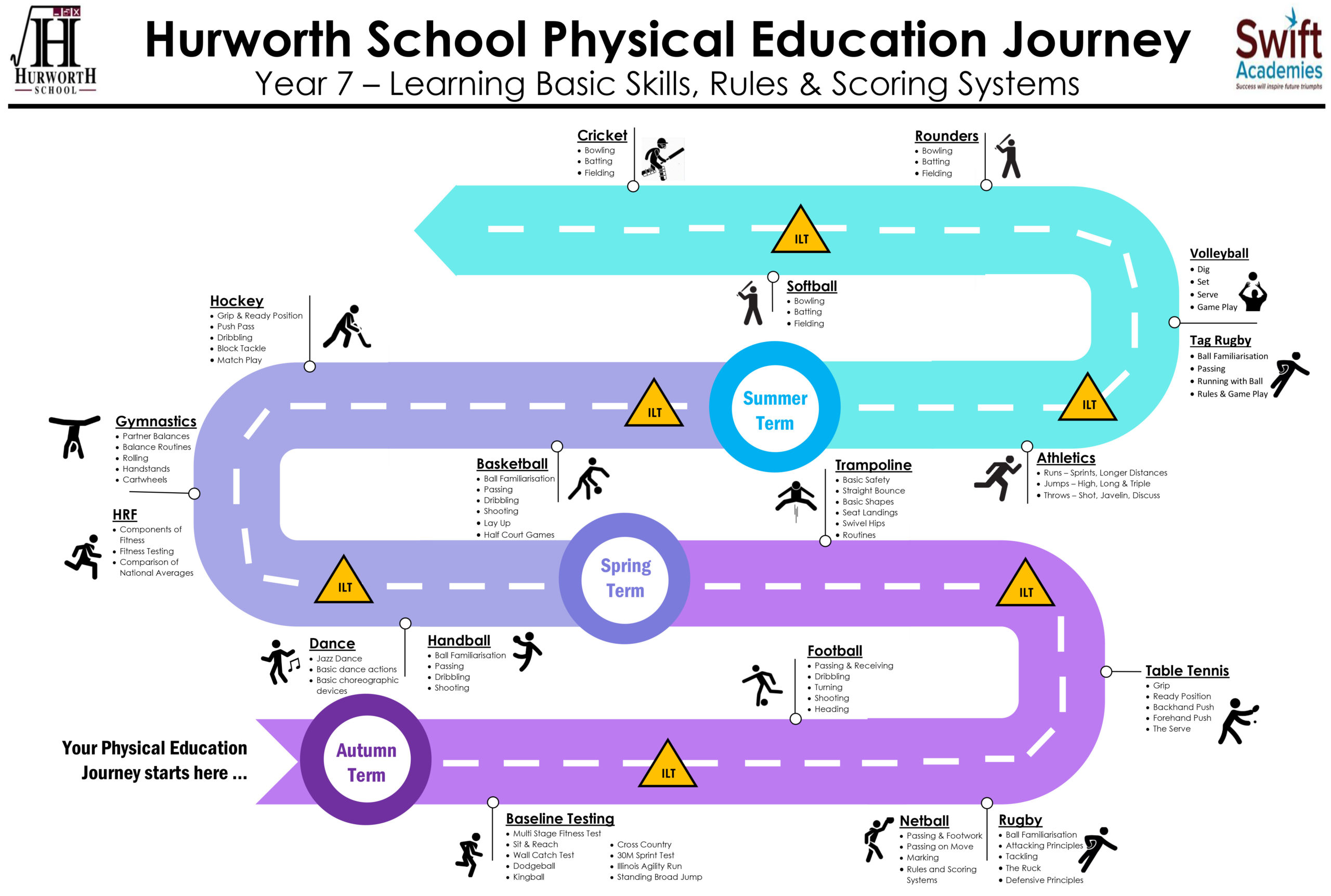
Year 8
Learning Outcomes
The curriculum in Year 8 broadens the skills and understanding taught in Year 7. Students are encouraged to participate as performers, coaches and officials whilst developing more complex skills and tactics within practical work. Examination themes continue to be developed across the curriculum via Independent Learning Tasks.
Topics Taught
Autumn Term
- Football
- Netball
- Rugby
- Table Tennis
- Trampoline
Spring Term
- Handball
- Dance
- HRF
- Gymnastics
- Hockey
- Basketball
Summer Term
- Athletics
- Tag Rugby
- Volleyball
- Rounders
- Cricket
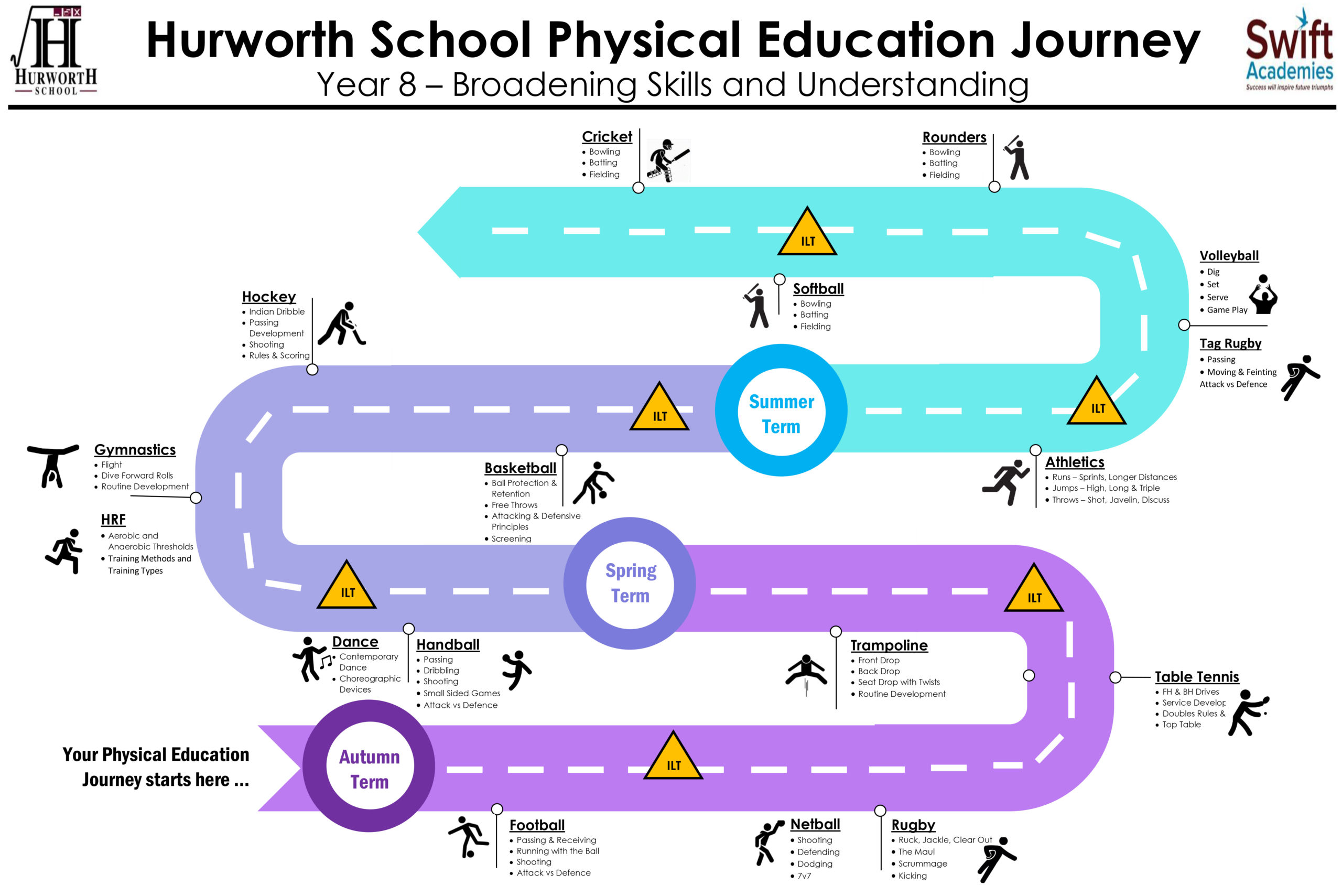
Year 9
Learning Outcomes
Our curriculum in Year 9 gives students the opportunity to embed skills and develop techniques in preparation for option pathway choices made at the end of Year 9. Emphasis is also placed upon encouraging students to develop tactics, strategies and to gain a thorough understanding of the rules and scoring systems of team and individual activities. Examination themes continue to be developed across the curriculum via Independent Learning Tasks.
Topics Taught
Autumn Term
- Football
- Netball
- Rugby
- Table Tennis
- Trampoline
Spring Term
- Handball
- Dance
- HRF
- Gymnastics
- Hockey
- Basketball
Summer Term
- Athletics
- Tag Rugby
- Volleyball
- Rounders
- Softball
- Cricket
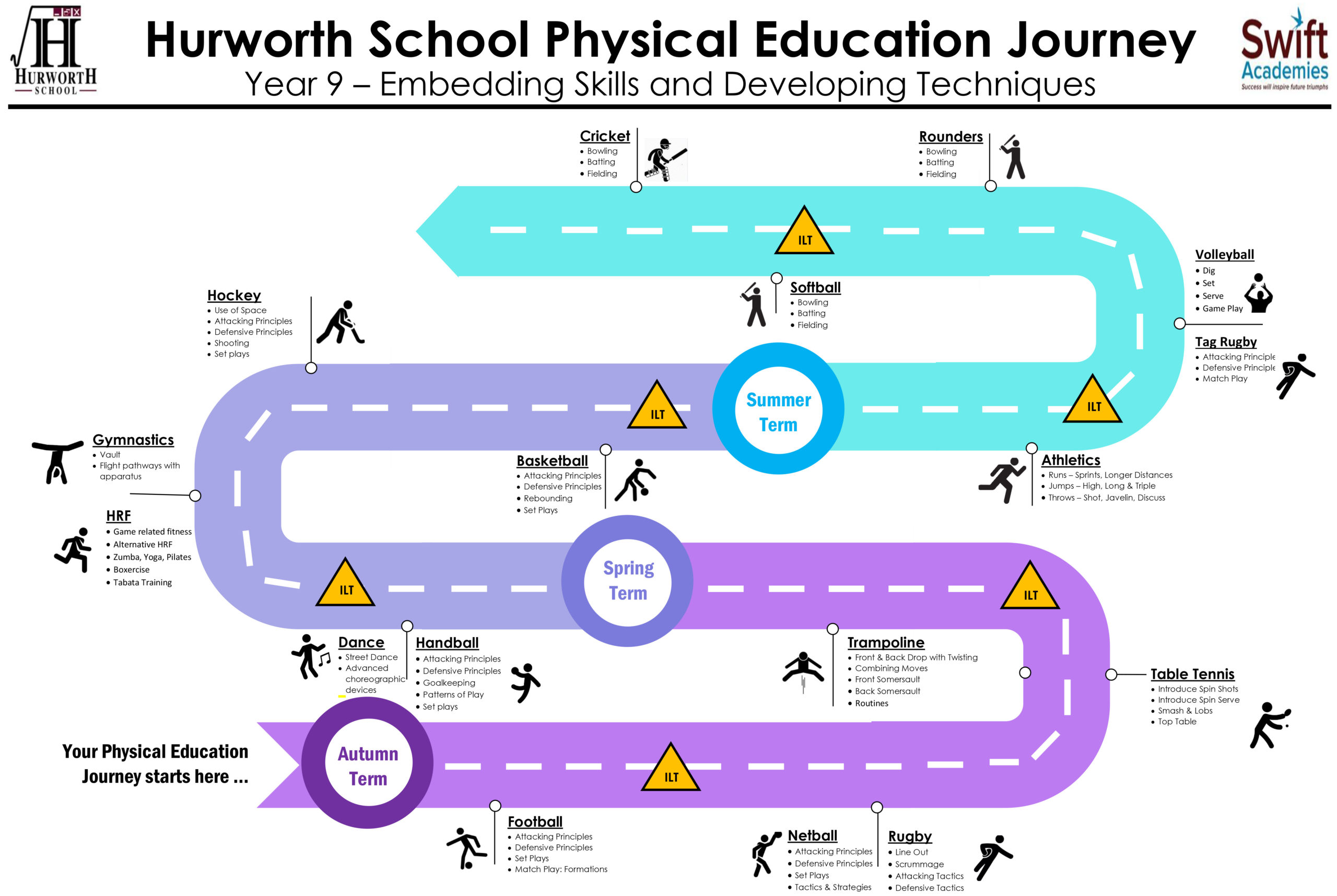
Year 10
Learning Outcomes
Our curriculum in Year 10 gives students the opportunity to study optional examination courses in GCSE or OCR Sport Studies. All students also continue to participate in core PE lessons where the emphasis is on encouraging participation and recreational play, whilst continuing to develop tactics, strategies and a thorough understanding of the rules of team and individual activities.
Topics Taught
Autumn Term
- Table Tennis
- Trampoline
- Futsal
Spring Term
- Football
- Netball
Spring Term
- Football
- Netball
- Strike & Field
Year 11
Learning Outcomes
Examination courses continue in Year 11. Students have the option to go to interventions instead of participating in core PE. Those students that opt to stay in core PE continue with a ‘recreational play’ approach.
Topics Taught
Autumn Term
- Table Tennis
- Trampoline
- Futsal
Spring Term
- Futsal
- Football
- Netball
Summer Term
AQA GCSE PE
Exam Specification
GCSE PE
AQA Specification
Learning Outcomes
Students who opt for GCSE PE follow the AQA GCSE PE specification throughout KS4.
GCSE PE is broken down into two main components: Examination and Non-Examination Assessment (NEA). The examination portion of the course is worth 60% of a students overall final grade. This is achieved by sitting two external examinations which are equally weighted at 30%. The theoretical element of the course is broken down into the following topic areas:
Paper 1 (30%):
- Applied Anatomy and Physiology
- Movement Analysis
- Physical Training
- Use of Data
Paper 2 (30%):
- Sports Psychology
- Socio-Cultural Influences
- Health, Fitness and Well-Being
- Use of Data
The NEA component of the course is worth 40% of a students overall final grade. This is broken down into two main areas: Practical Performance (30%) and Analysis and Evaluation (10%). Students are assessed on their performance in three sporting activities, this must comprise of: one individual sport, one team sport and a final sport from either category. Students must also select one of these activities for self-analysis and evaluation and create an action plan to bring about improvement.
Resources
- Infographics – All Blocks
- PE Key Vocab
- How to Revise
- GCSE PE
- The EverLearner
- GCSE PE Bitesize Revision Platform
Topics Taught
| Autumn Term | Spring Term | Summer Term | |
| Year 10 | Paper 1: Physical Training Anatomy Paper 2: Sports Psychology | Paper 1: Anatomy Paper 2: Sports Psychology | Paper 1: Physiology Paper 2: Socio-Cultural Influences |
| Year 11 | Paper 1: Movement Analysis Paper 2: Health, Fitness and Well-Being | Performance Analysis and Assessment Completion Practical Moderation Assessment Preparation Examination Revision | NB: Pupils will cover a range of team and individual practical activities over KS4. |
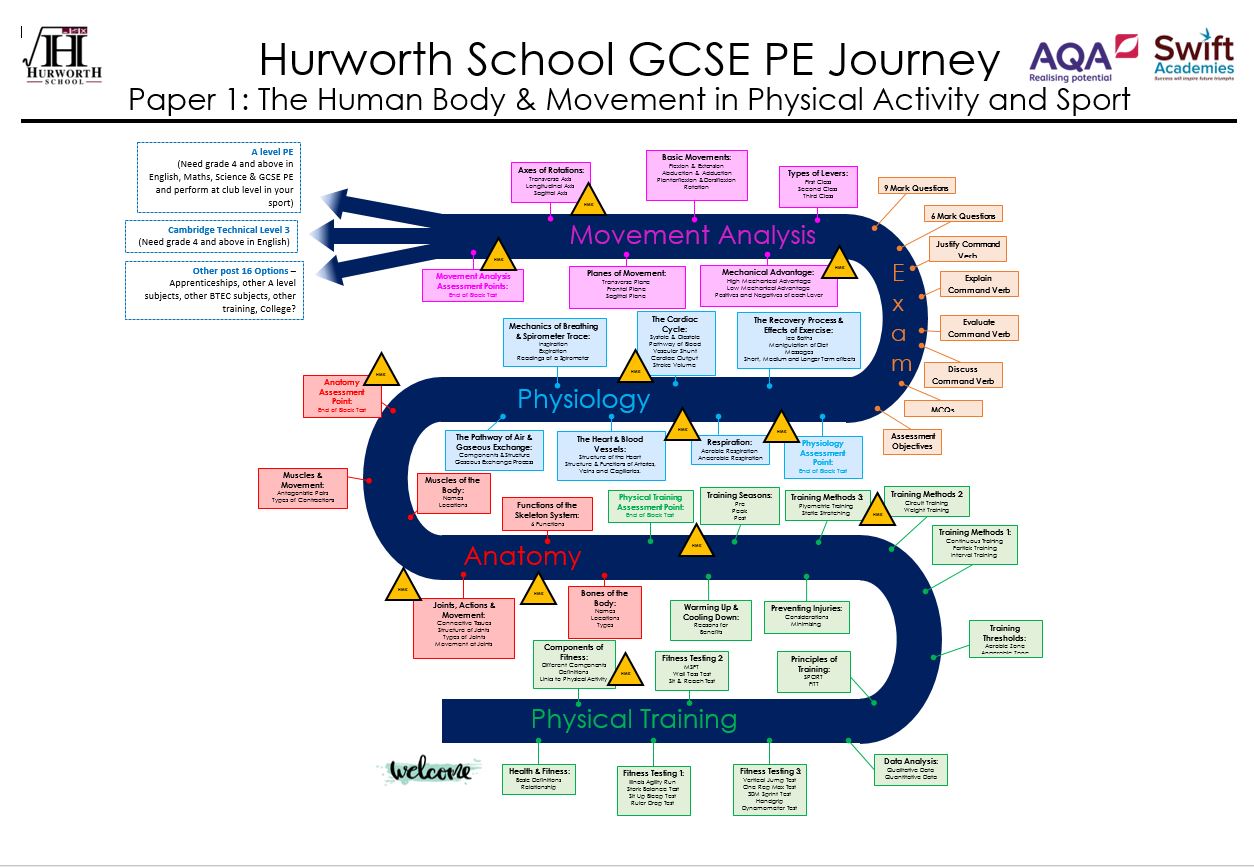
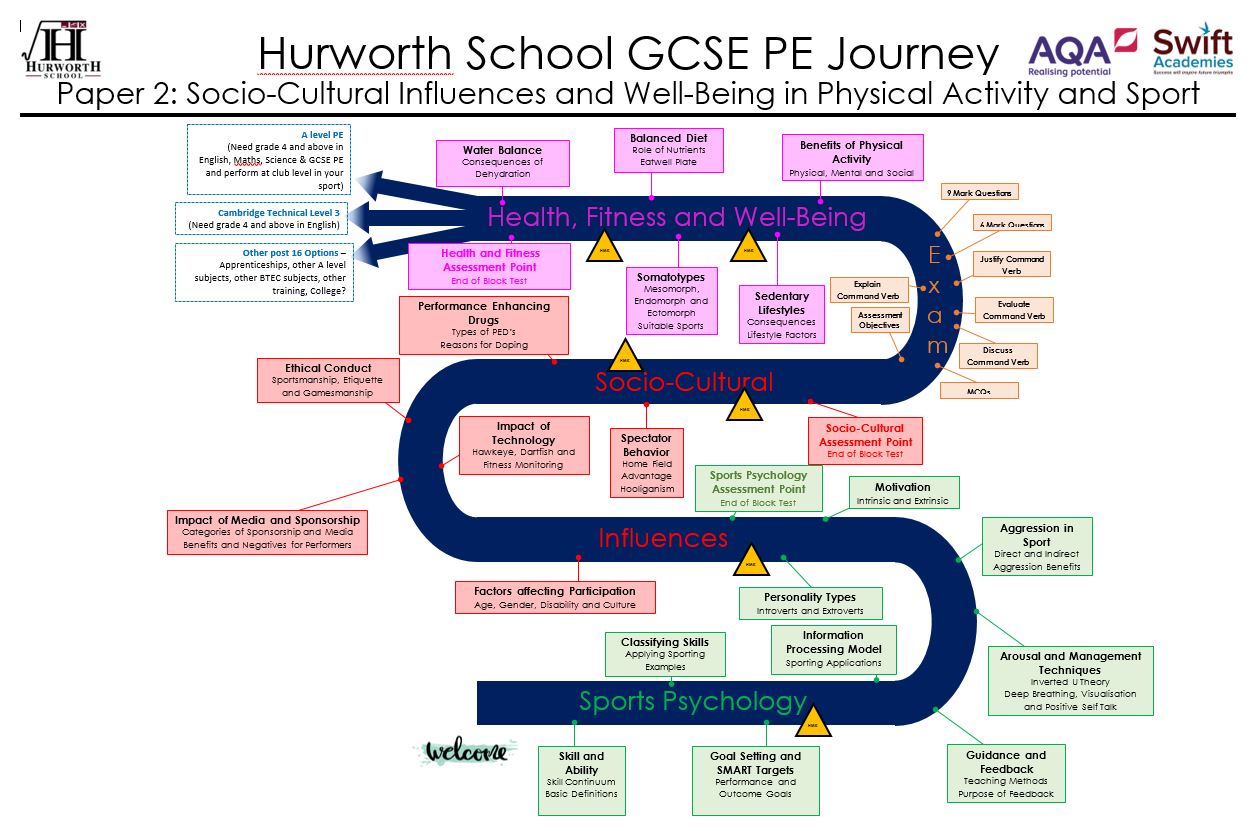
OCR CAMBRIDGE NATIONAL SPORT STUDIES
Exam Specification
Sport Studies
Cambridge Nationals
Learning Outcomes
Students who opt for Sport Studies will follow the OCR Cambridge National specification throughout KS4.
The Cambridge Nationals in Sport Studies takes a more sector-based focus, whilst also encompassing some core sport/physical education themes. Learners have the opportunity to apply theoretical knowledge about different types of sport and physical activity, skills development and sports leadership to their own practical performance. They will learn about contemporary issues in sport such as funding, participation, ethics and role models, and sport and the media. Learners will develop an appreciation of the importance of sport locally and nationally, different ways of being involved in sport and of how this shapes the sports industry.
OCR Sport Studies is broken down into four units of work. 25% of which is assessed via an external exam and 75% is internally assessed. The units of work studied are:
Externally Assessed
- RO51: Contemporary Issues in Sport Internally Assessed
- RO52: Developing Sport Skills
- RO53: Sports Leadership
- RO54: Sport & the Media
Resources
- RO51 Unit Overview
- OCR Topics Infographics
- https://theeverlearner.com/
- https://www.bbc.co.uk/bitesize/examspecs/ztrcg82
Topics Taught
| Autumn Term | Spring Term | Summer Term | |
| Year 10 | RO51 – Contemporary Studies | RO53 – Sports Leadership | RO53 – Sports Leadership |
| Year 11 | RO52 – Developing Sports Skills | RO54 – Sport and the Media |
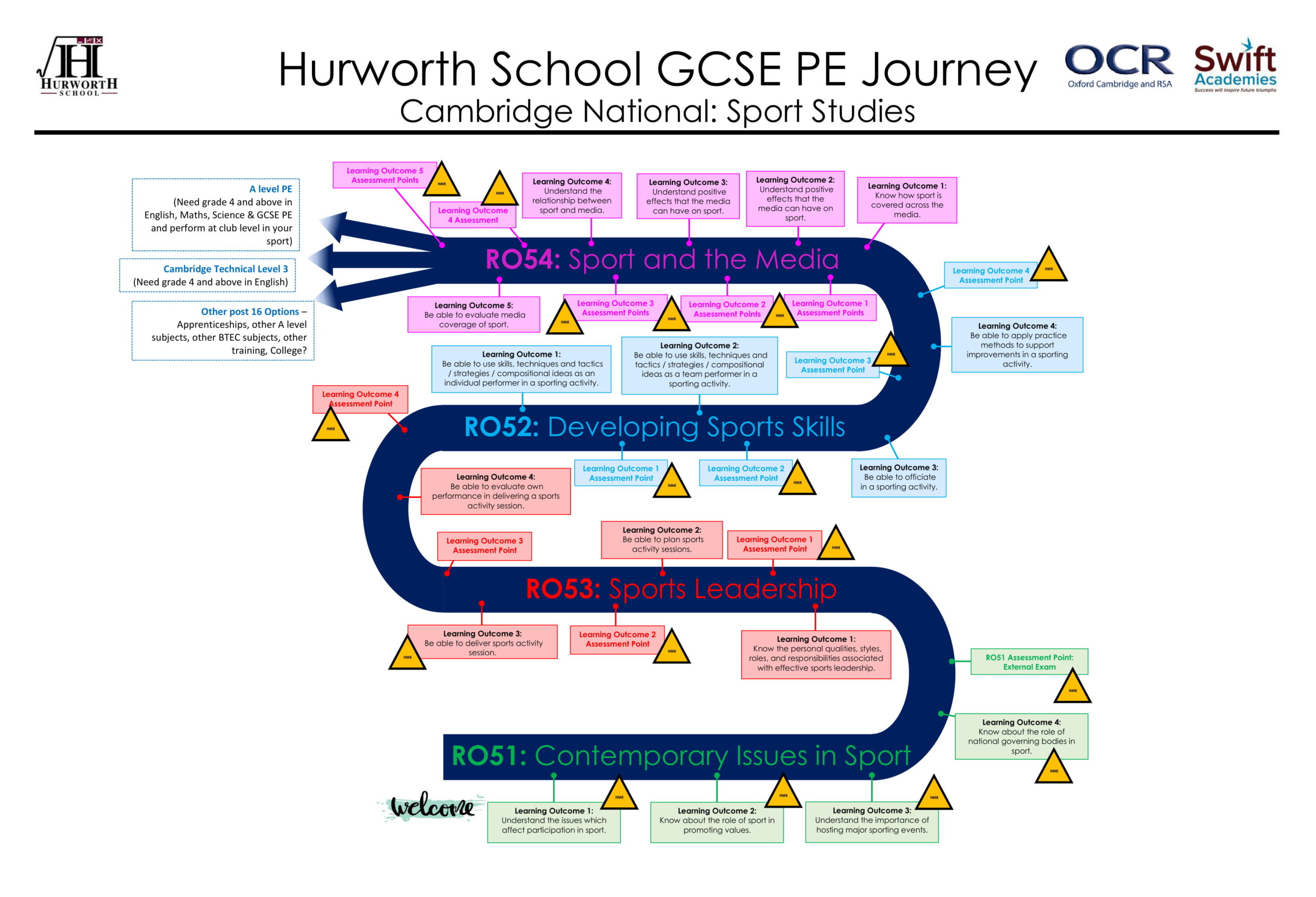
SPORTS STUDIES
Learning Outcomes
Sport Studies takes a more sector-based focus, whilst also encompassing some core sport/Physical Education themes. Students will have the opportunity to apply theoretical knowledge about different types of sport and physical activity, skills development and sports leadership to their own practical performance. They will learn about contemporary issues in sport such as funding, participation, ethics and role models, and sport and the media. Students will develop an appreciation of the importance of sport locally and nationally, different ways of being involved in sport and of how this shapes the sports industry. 40% of which is assessed via an external exam and 60% is internally assessed.
Externally Assessed:
- R184 – Contemporary Issues in Sport = 40% of the final grade
Understand topical and contemporary issues in sport, including; why people do and do not participate in sport, the promotion of ethics and values, the roles of National Governing Bodies and high profile events have in sport, as well as how technology is used within sport.
Internally Assessed:
- R185 – Practical Performance and Leadership = 40% of the final grade
Develop skills as a performer in two different sporting activities. You will also learn how to lead sporting activity sessions. Also, you will analyse your own performance to help improve your own skills in sport.
- R186 – Sport and the Media = 20% of the final grade
Explore the relationship that media has with sport and understand how linked they are. The relationship to real world examples and the different ways in which sport and the media represent each other will be applied
Resources
Topics Taught
| Autumn Term | Spring Term | Summer Term | |
| Year 10 | R185: Performance and Leadership | R185: Performance and Leadership | R185: Performance and Leadership |
| Year 11 | Sport & the Media | R184: Contemporary Issues in Sport | R184: Contemporary Issues in Sport |
